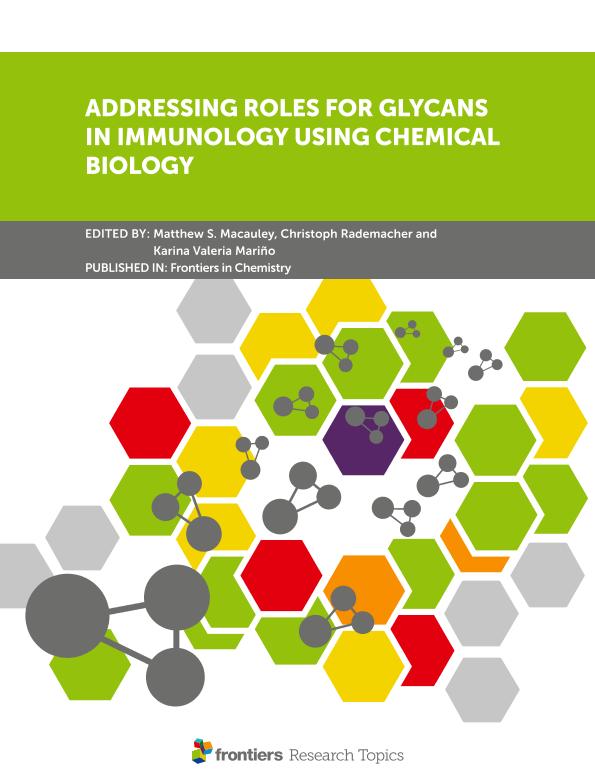Mostrar el registro sencillo del ítem
dc.contributor.author
Macauley, Matthew S.
dc.contributor.author
Rademacher, Christoph
dc.contributor.author
Mariño, Karina Valeria

dc.date.available
2021-05-24T20:45:04Z
dc.date.issued
2020-06
dc.identifier.citation
Macauley, Matthew S.; Rademacher, Christoph; Mariño, Karina Valeria; Editorial: Addressing roles for glycans in immunology using chemical biology; Frontiers Media S.A.; Frontiers in Chemistry; 8; 6-2020; 471-471
dc.identifier.issn
2296-2646
dc.identifier.uri
http://hdl.handle.net/11336/132530
dc.description.abstract
Glycoconjugates, macromolecules containing carbohydrates (glycans) conjugated to proteins or lipids, are a diverse class of biopolymers capable of regulating cell-cell interactions. They are present in a high, natural heterogeneity, which originates from the complex mechanisms involved in their biosynthesis. Genetic and environmental factors determine the ensemble of glycans on any particular cell type, in a non-template encoded manner. As a consequence, the cell surface glycan profile provides a tightly-regulated temporal and spatial signature containing crucial biological information. This information is translated into biological functions by glycan binding proteins (GBPs), also called lectins. Importantly, our immune system is modulated by three major GBP families: C-type lectins, galectins, and Siglecs. The abilities of these GBPs to modulate immune cell function is intimately connected to their ability to differentiate ?self? or ?non-self? glycans from our own cells or pathogens, respectively. Hence, GBP?glycan interactions are critical mediators in immune cell homeostasis. Genetic manipulation of glycan processing enzymes has shed light on the roles of glycans in pathologies such as autoimmune diseases and cancer. However, genetic tools such as genomic manipulation and transgenic animal models have shown to be insufficient to fully untangle the roles of GBP-glycan interactions. Accordingly, recent advances in our understanding of GBPs and how they control immune cell function via glycan recognition has been driven by the development of chemical tools.In this Research Topic, we explore recent work illuminating the various roles of glycans and/or GBPs in controlling immune cell function with special emphasis placed on chemical biology approaches that have been instrumental in such efforts. Potential subjects covered may include:? Immunological roles of Glycan-binding proteins? Glycans as immunomodulators? Development of ligands to probe glycan-binding proteins? Chemical biology approaches to modulate glycan-binding proteins and their glycan ligands? Glycans and synthetic derivatives as novel adjuvants? Glycan-based targeted delivery? Intracellular glycosylation in immune cells? Tissue homing of immune cells mediated by glycans? Glycolipid presentation to immune cells? Glycan-based vaccines? Analytical methods for functional characterization of lectin-glycan interactions
dc.format
application/pdf
dc.language.iso
eng
dc.publisher
Frontiers Media S.A.
dc.rights
info:eu-repo/semantics/openAccess
dc.rights.uri
https://creativecommons.org/licenses/by-nc-sa/2.5/ar/
dc.subject
CARBOHYDRATES
dc.subject
CHEMICAL BIOLOGY
dc.subject
GLYCAN BINDING PROTEIN (GBP)
dc.subject
GLYCANS
dc.subject
GLYCOIMMUNOLOGY
dc.subject.classification
Inmunología

dc.subject.classification
Medicina Básica

dc.subject.classification
CIENCIAS MÉDICAS Y DE LA SALUD

dc.title
Editorial: Addressing roles for glycans in immunology using chemical biology
dc.type
info:eu-repo/semantics/article
dc.type
info:ar-repo/semantics/artículo
dc.type
info:eu-repo/semantics/publishedVersion
dc.date.updated
2021-04-22T20:06:12Z
dc.journal.volume
8
dc.journal.pagination
471-471
dc.journal.pais
Suiza

dc.journal.ciudad
Lausanne
dc.description.fil
Fil: Macauley, Matthew S.. University of Alberta; Canadá
dc.description.fil
Fil: Rademacher, Christoph. Max Planck Institute of Colloids and Interfaces; Alemania
dc.description.fil
Fil: Mariño, Karina Valeria. Consejo Nacional de Investigaciones Científicas y Técnicas. Instituto de Biología y Medicina Experimental. Fundación de Instituto de Biología y Medicina Experimental. Instituto de Biología y Medicina Experimental; Argentina
dc.journal.title
Frontiers in Chemistry
dc.relation.alternativeid
info:eu-repo/semantics/altIdentifier/doi/http://dx.doi.org/10.3389/fchem.2020.00471
dc.relation.alternativeid
info:eu-repo/semantics/altIdentifier/url/https://www.frontiersin.org/articles/10.3389/fchem.2020.00471/full
Archivos asociados
